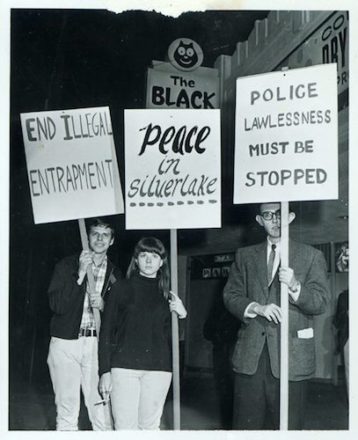
These activists are protesting in early 1967 at the Black Cat bar in Silver Lake in response to Los Angeles police brutality against gay people. Photo: ONE Archives at the USC Libraries.
SILVER LAKE — The LGBTQ civil rights movement has some of its early roots in Silver Lake. In 1967, the Black Cat bar on Sunset Boulevard was the site of one of the nation’s first organized LGBTQ demonstrations. Activists were protesting Los Angeles police harassment and violence at the neighborhood gay bar.
This landmark demonstration — along with numerous others in Los Angeles, San Francisco and across the country in the mid-1960s — helped launch the gay civil rights movement. The Black Cat protest happened more than two years before the Stonewall riots in New York City.
LGBTQ activists will mark the historic 50th anniversary of the Black Cat demonstration with a re-enactment, celebration, march and a modern-day political rally on February 11, which is 50 years to the date of the original 1967 protest, at The Black Cat. The event is scheduled to begin at 8 p.m.
THE BLACK CAT
“Los Angeles and the 13th Council District have been ground zero for some of the most important events in LGBT history, especially the watershed Black Cat protests that took place right here in Silver Lake,” Councilman Mitch O’Farrell said in a statement announcing the commemoration.
“It wasn’t that long ago that people like me were targeted by the police for being true to ourselves. Lives were ruined, and a whole class of people were marginalized,” O’Farrell said. “We have come a long way since 1967, but new threats loom on the horizon from the Trump Administration, threatening our civil rights and those of other traditionally persecuted communities.”
Daniel Henning, founding artistic director of The Blank Theatre and one of the event organizers, has recruited actors to help re-enactment the demonstration on February 11. Henning also lives in the neighborhood and wants to spotlight to early protest.
HISTORIC PROTEST
“As a resident of Silver Lake, I am proud of the legacy of those brave souls fighting for our rights in 1967,” Henning said in the statement. “It’s an important story to tell the next generation so they can make sure the rights we fought for so strongly continue into the future.”
Shortly after midnight on January 1, 1966, as balloons dropped from the ceiling to mark the New Year, undercover Los Angeles Police Department officers, who were waiting for the right moment to pounce, ripped holiday decorations from the wall, beat and arrested 14 people. Six people were booked and eventually charged with lewd conduct because they were kissing.
Six weeks later, hundreds of demonstrators picketed in front of the Silver Lake bar and demand the Los Angeles police stop harassing and arresting gay people. Protestors carried signs that read “End Illegal Entrapment,” “Peace in Silver Lake” and “Police Lawlessness Must Be Stopped.”
While the Black Cat protest didn’t change Los Angeles police policy toward the gay community, it was part of a wave of protests and demonstrations that helped launch the LGBTQ civil rights movement. The event also sparked the rise of The Advocate, one of the country’s first LGBTQ publications.
CULTURAL MONUMENT
“We feel it is our role, being at the center of the physical location, to keep this story alive,” said Lindsay Kennedy, one of the owners of modern-day Black Cat, which was converted to a restaurant in 2012. “It is our obligation to the community to be caretakers of that history. To us, gay rights are human rights.”
In 2008, the building that once housed the Black Cat (the famous smiling black cat face sign still graces the location) was declared by the Los Angeles Cultural Heritage Commission a historic cultural monument. A plaque recognizing the Black Cat as the site of the nation’s first LGBTQ demonstration was unveiled in 2013. But, the claim is erroneous, as historians have pointed to earlier organized homophile demonstrations, including one at the White House in 1965 and annual July 4th protests at Independence Hall in Philadelphia from 1965 to 1969.
Alexei Romanoff, one of the organizers of the 1967 protest, is expected to make a few public remarks at the celebration.
“We, the American LGBTQ community, have made tremendous progress since then, but our struggle for full acceptance continues,” Romanoff said in the same statement. “Nothing is more appropriate for this special occasion than to revisit the site, learn what happened and why, and join in rededicating ourselves to finish the work we began so many years ago.”
Editor’s note: This story has been corrected. The Black Cat protest was one of the nation’s first organized LGBTQ demonstrations.
